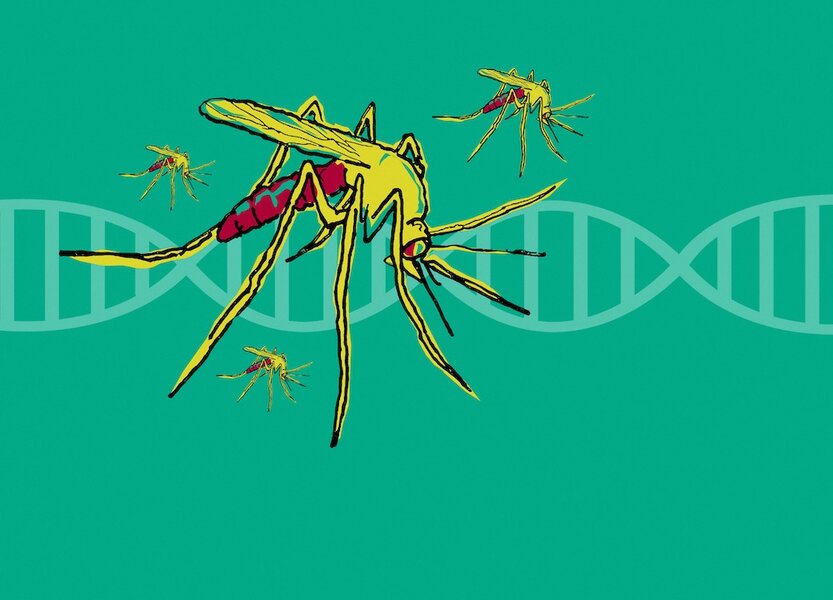Create a free profile to get unlimited access to exclusive videos, sweepstakes, and more!
A genetic key could make mosquitos forever young and never reproduce
It's basically a mosquito puberty blocker and could save human lives.

The discovery of DNA in 1869 went largely unnoticed by the scientific community. It would be decades before biologists realized the significance of the discovery and nearly a century before Watson and Crick described the double helix structure. In the 1990s, the field had progressed to the point that scientists endeavored to sequence the first genomes, including the human genome, and DNA fever captured the public imagination.
That happened, in no small part, because of Michael Crichton’s bestselling novel Jurassic Park, and the subsequent film franchise which is still going strong today. Both in movies and in real-world labs, much of the thinking around the power of DNA hinges on saving endangered species and even bringing extinct species back from the dead, but the inverse is also possible.
Naoki Yamanaka from the Department of Entomology and the Institute for Integrative Genome Biology at the University of California is harnessing the power of genetics to develop new methods for wiping disease-bearing mosquitos from the face of the Earth. Their findings were published in the Proceedings of the National Academy of Sciences.
Yamanaka has spent the last several years studying membrane transporters responsible for incorporating a steroid hormone called ecdysone into insect cells. Ecdysone is a critical hormone for maturation and reproduction in every species of insect. It is analogous, in some ways, to testosterone and estrogen in humans. Without it, insects aren’t capable of growing up or reproducing. In nearly every insect species they investigated, ecdysone was delivered to the cells by the same membrane transporter. That is, until they looked at mosquitos.
“We took a look at different genomes from different insect species and for some unknown reason, this gene was only missing in mosquitos. They don’t have this membrane transporter, but ecdysone is still important in mosquitos,” Yamanaka said.
In order to get ecdysone into their cells, mosquitos rely on alternative membrane transporters which are also apparent in other insects, but rarely used. We can think of these membrane transporters as gates through which steroid hormones travel. Most insects have a primary gate with additional alternative gates which aren’t as frequently used. Mosquitos, however, don’t have the most common gate at all and rely entirely on the alternative gates.
Scientists looked at the three species of mosquito which are most commonly responsible for disease transmission in humans and found the primary membrane transporter missing in each case. They think this suggests its absence is a feature of all mosquitoes. Conversely, the primary membrane transporter was present in every other insect species they looked at. This genetic feature, unique to mosquitos, means scientists can create new insecticides to target them without impacting any other animals. At least, that’s the hope.
“Because other insects have the original [membrane transporter] we found, which is most important, they are totally fine even without the additional ones. In the case of mosquitos, they lack this primary one and that’s why we can target these additional transporters and hopefully affect development in reproduction only in mosquitos,” Yamanaka said.
The idea is to develop compounds which would target and block the alternative membrane transporters, essentially closing the alternative gates through which steroid hormones travel. If such a compound could be developed and were applied to mosquito populations, it would essentially stop them in their tracks.
“If we apply it to the larvae, we expect they will be trapped as larvae. We can also develop a pesticide for the transporter important to reproduction and if we apply it to adult females, we expect that they won’t lay eggs,” Yamanaka said.
Chemical pesticides have a deadly history of unintended consequences to untargeted plants and animals who found themselves in the wrong place at the wrong time. Anytime chemical pesticides are implemented in the environment, it’s critical that we minimize the collateral damage to the ecosystem, wherever possible. Developing new pesticides which exploit a weakness in mosquito DNA might allow us to entirely eliminate any negative impact on unintended species.
Of course, there are many species for which we don’t have robust genomic data and scientists are working to ensure the process is safe before it is implemented. With any luck, mosquitos and the diseases they carry might someday be a thing of the past.



























